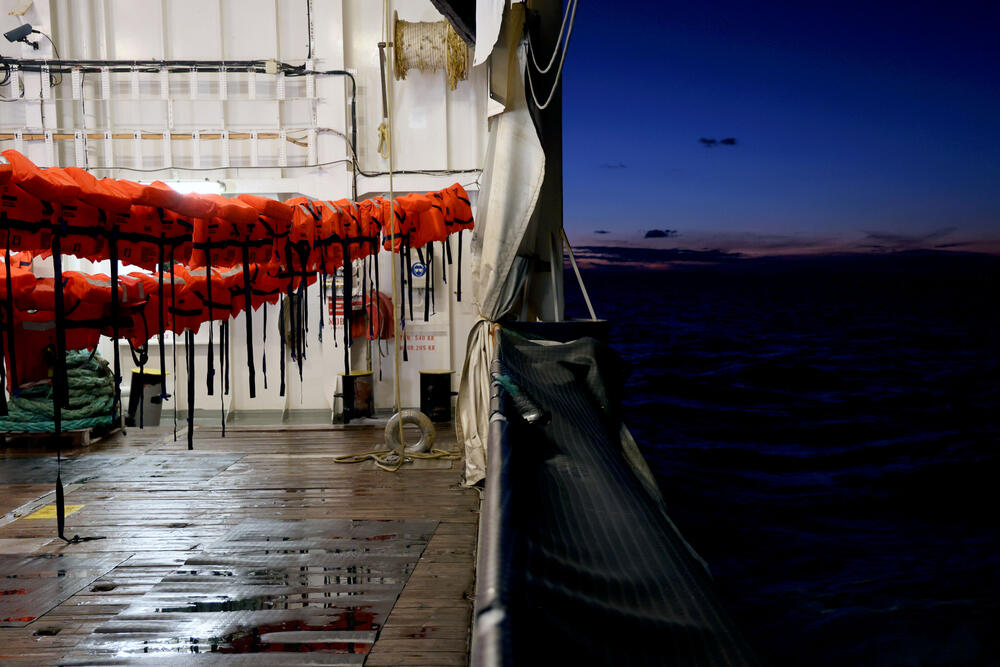MSF forced to end search and rescue operations in the Central Mediterranean
Today, Médecins Sans Frontières / Doctors Without Borders (MSF) announces that operations have ceased on board its rescue vessel, Geo Barents, which had been operational since June 2021.
Italian laws and policies have made it impossible to continue with our current operations. MSF will begin a process to evaluate the best operational model for this challenging environment, promising to return to search and rescue activities.
MSF reaffirms its solid commitment towards people on the move, especially those taking the dangerous journey across the Central Mediterranean Sea – a route where over 31,000 people have died or gone missing since 2014.
“MSF will be back as soon as possible to conduct search and rescue operations on one of the deadliest migration routes in the world,” says Juan Matias Gil, MSF search and rescue representative.
“We will come back to bear witness and speak out against the violations committed against people on the move by EU member states, particularly by Italy, and the other actors in the area.”
In the past two years, Geo Barents faced four sanctions by the Italian authorities, imposing a total of 160 days of detention in port. These sanctions only served to punish the vessel for merely fulfilling the humanitarian and legal duty to save lives at sea.
These punitive measures came under the Piantedosi Decree, a law that was introduced by the Italian government at the beginning of 2023. In December 2024, Italy further intensified the harshness of the sanctions by making it easier and faster to confiscate humanitarian search and rescue vessels.
“The stories of tens of thousands of survivors are echoed everywhere on the Geo Barents. Babies have taken their first steps on these decks; people have mourned their loved ones.”
The practice of Italian authorities to assign distant ports, frequently in the north, to disembark people rescued at sea has further undermined the capacity of the Geo Barents to save lives at sea and be present where it is needed the most.
Since the implementation of the Piantedosi Decree, the Geo Barents has spent half a year navigating to and back from distant ports instead of assisting people in distress.
In June 2023 the Italian authorities instructed the Geo Barents, which can fit up to 600 people on board, to head to La Spezia, in the north of Italy, to disembark 13 survivors. This amounted to navigating more than 1,000 kilometres, despite the availability of much closer ports.
“After careful consideration, we have come to the conclusion that it is untenable to operate the Geo Barents under such absurd and senseless Italian laws and policies,” says Gil.
“The rescue capacity of humanitarian vessels is significantly under-utilised and actively undermined by the Italian authorities.
Margot Bernard, MSF project coordinator adds:
“Italy’s laws and policies express genuine disregard for the lives of the people crossing the Mediterranean. The stories of tens of thousands of survivors are echoed everywhere on the Geo Barents. Babies have taken their first steps on these decks; people have mourned their loved ones.
“When the European deterrence policies cause so much suffering and cost so many lives, we have the duty to persist in favour of humanity.”
Explained: MSF and Mediterranean search and rescue
MSF has been active and engaged in Search and Rescue activities in the Central Mediterranean Sea since 2015, working on eight different vessels (alone or in partnership with other NGOs) and rescuing more than 94,000 people.
MSF has been operating its latest rescue vessel, the Geo Barents since June 2021, with 12,675 people rescued and brought to safety in 190 rescue operations. During this period, the team also recovered the bodies of 24 people and assisted in the delivery of one baby.
During the two years since the implementation of the Piantedosi Decree, MSF has exhausted all legal channels and appealed the punitive sanctions and the distant port practice in Italian courts, successfully obtaining two suspensions of 60-day detention orders.
MSF and other NGOs have also submitted five individual complaints to the European Commission, urging it to examine the restrictions in light of EU law, which have been unsuccessful so far.
The crisis in the Central Mediterranean
Every year, thousands of people fleeing violence, insecurity, and persecution attempt to cross the Mediterranean Sea.
They make this treacherous journey via North Africa and Turkey, in search of relative safety in Europe.
And, every year, countless lives are lost at sea, while people face unimaginable cruelty on their way through transit countries such as Libya.
Between 2014 and 2022, at least 20,248 people have drowned or gone missing while attempting to cross the Central Mediterranean. It is widely considered to be the world's deadliest border.
